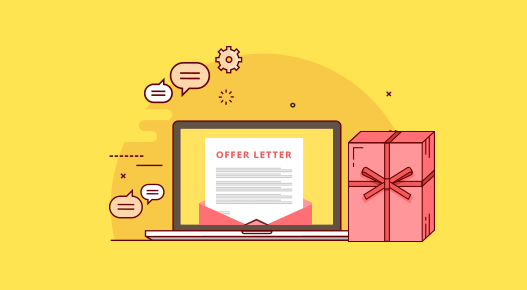How to write a standout job offer email

What are the defining factors that will make a candidate accept your job? Your offer per se is what matters, but presentation also plays an important role. Your job offer email should clearly communicate all necessary job details and information your candidate should know before making up their mind. It should also give them an idea of what it will be like to work at your company.
It’s a common mistake to think that your candidate will definitely accept your job. Offer emails aren’t routine, standardized letters — they’re part of your company’s recruiting pitch. eShares‘ unique job offer letter can give you a bit of inspiration. You don’t necessarily have to go that far though, just make sure your email presents everything clearly. This tutorial can help you write a standout job offer email to complement your hiring process and make potential hires lean towards your company.
How to start
Research labor law
Before writing your email, do your employment legislation homework. Is there something particular you should take into account? For example, some states have specific overtime laws, so make sure you stay up-to-date with legislative changes. Also, don’t forget to check the at-will employment rules that apply to your company. (At-will employment means that the employer or the employee may terminate their employment relationship for no reason, or for any legal reason, with no adverse legal consequences. In most states, unless you signed some sort of employment contract that states otherwise, you’re assumed to be an at-will employer.)
Update the job details
If the recruiting process took some time, it’s possible the hiring managers have reconsidered some of the job responsibilities. Check with them to make sure the information you’re about to give your candidate is accurate and complete.
Decide your style
Depending on your company culture, you could use a more formal or casual template. You may also want to write a longer job offer email, providing more detailed information about compensation and benefits. Consider attaching relevant documents to keep your email short and easy to read. Don’t overdo it, though. It’s the first email you’re sending them to initiate — hopefully — your collaboration, so prioritize what’s most important. Use a step-by-step approach to give your new hire all the necessary information without being overwhelming.
Make a verbal offer
If you want to speed up the hiring process, you shouldn’t rely on email alone. Calling your candidate first adds a personal touch. Prompt them to check their emails later in the day to find out more details about your job offer. You’re more likely to get a quick response if they’re expecting your offer via email.
What to include
Subject line
In most cases, it’s common to overlook an email’s subject line and focus on the content. But, the title you choose may determine whether the recipient will open your email. When you’re writing a job offer email, you don’t want to leave your candidate guessing. They should know, even from the subject line, that you’re offering them a position. You can use something like: [Company_name] Job Offer / Job Offer from [Company_name].
Basic job information
You need to present all the essential information your new employees want to know. Interviews can be a stressful process for candidates, so even if you’ve already mentioned some details about the job, your new hire might have missed something. Clarify your expectations and make sure your new employee acknowledges their working conditions to avoid confusion later on.
Start with their job title and who they’ll report to. Include full/part-time status, contract length (if applicable), working hours and expected starting date.
It is my pleasure to offer you a position at [company name] in the role of [role title]. You will be reporting to the Head of our [team name] team which belongs in the [department name] department. Your expected starting date is [date].
Salary
Salary is usually the number one concern for employees, so make sure all information you include in this section is clear and accurate. In addition to the annual gross salary, you could also consider mentioning payroll details, like frequency or method of payment.
Benefits
Your future employees are interested in finding out what benefits they’ll be eligible for. It’s up to you to disclose as many as you want, keeping in mind that your offer has to be meaningful to the recipient. Usually recruiters include information about health and insurance plans, days of paid vacation, 401(k) retirement plan, bonus programs and stock options in their offer letter. Other perks you could consider adding, to draw your potential hire’s attention, include corporate mobile plans, free lunches and flexible working hours.
Don’t miss: 8 job offer letter templates for every circumstance with extra tips
Contingencies
In some cases, you’re required to perform background checks or health and drug tests on potential employees. If this applies to your company, you should clearly state that your offer is contingent upon your potential new-hire completing an I-9 form, passing their drug or background test or signing any necessary agreements.
Next steps
No matter how explicit you are, your new hire might still want to negotiate, ask questions or change their start date. Make sure to let them know who to contact, should they have any questions.
Some employees might be confused about what to do after they’ve decided to accept a job offer, considering every company follows its own procedures. So, you should clearly indicate when you’d like their answer by; a 5 to 7 day timeframe is usual. You could also give them a heads up on what personal information or signed paperwork they’ll need to send over.
Related: Job offer acceptance rate metrics FAQ
How to personalize
Likely, there were no more than two or three people who made it to the final phase of your interview process. This means you’ve probably gotten to know them enough to make the job offer email a bit more personal. Certainly, your candidate wants to know all the ‘important stuff’ like salary and benefits, but it never hurts to let people know you’re excited they’ll be joining your team.
At Workable, we use a simple sentences like “our hiring team was positively excited to meet and get to know you over the past few days” to show that we’re looking forward to our new team member’s arrival.
Or, you could write something to highlight how your potential hire successfully went through your hiring process: “We were impressed with how you approached your assignment and we’re looking forward to seeing you achieve great things with our team.”
Every means of communication you use is a reflection of your corporate culture and that applies to your job offer email, as well. More casual word choice and lack of formality suggests an open communication culture. If you invest in your employees’ development, you could mention, for example, that their benefits plan includes regular participation in seminars.
If your candidate has already verbally accepted your job offer, you could format your job offer letter more like a ‘welcome package.’ You could add some contacts they could reach out to before their arrival, like their manager or some of their new colleagues. Or, get more creative: send a ‘welcome’ note from their team or let them know you have a coffee mug with their name on it, waiting at their desk.
Keep in mind
- The purpose of your job offer email is to make things clear. So, after you’ve crafted your email, take some time to read it again before hitting ‘send.’ Do you find something ambiguous? Then, your candidate might be confused as well. For example, you should be extra careful when using phrases like ‘in two years’ or ‘in the future’ that imply an indefinite contract, if that’s not what you’re providing.
- Although it’s not a contract, this email contains important and confidential information about your company. Make sure it’s accurate and complies with the law. It’s a good idea to ask a lawyer review your template to ensure your phrasing doesn’t leave any room for misinterpretations or shows discrimination. Bonus programs, for example, aren’t usually a guarantee for the future, so clarify that they will be subject to changes.
- It’s usually the recruiter’s role to write the job offer email. But often it makes sense for the hiring manager to hit ‘send.’ Also, it’s a good idea to attach a short message from the company’s CEO to showcase your team environment and make your potential employee feel welcome.
Give your future employee some time to review your job offer email, answer any questions they may have and prepare for salary negotiations. When you have your new hire’s written job acceptance, let their manager know and initiate the onboarding process. But also, don’t forget those candidates who didn’t make it; it’s time to start writing your rejection letters.




